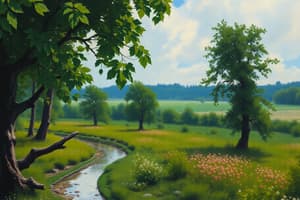Podcast
Questions and Answers
What is a major consequence of the indiscriminate use of resources?
What is a major consequence of the indiscriminate use of resources?
- Enhancement of technology
- Increase in the population of species
- Creation of ecological crises (correct)
- Improvement in resource distribution
What concept does sustainable economic development emphasize?
What concept does sustainable economic development emphasize?
- Development focused solely on technology
- Complete cessation of resource use
- Maximizing profits irrespective of the environment
- Development without compromising future needs (correct)
What was the primary purpose of the Rio de Janeiro Earth Summit in 1992?
What was the primary purpose of the Rio de Janeiro Earth Summit in 1992?
- To develop new natural resources
- To address environmental and socio-economic issues (correct)
- To explore options for aggressive industrial growth
- To distribute resources evenly among nations
Which of the following is NOT a result of resource depletion?
Which of the following is NOT a result of resource depletion?
What critical global principle was endorsed at the Rio Convention?
What critical global principle was endorsed at the Rio Convention?
What issue arises from the accumulation of resources in a few hands?
What issue arises from the accumulation of resources in a few hands?
How does sustainable development view the relationship between current needs and future generations?
How does sustainable development view the relationship between current needs and future generations?
Which of the following best describes a major ecological crisis caused by resource exploitation?
Which of the following best describes a major ecological crisis caused by resource exploitation?
What year was Agenda 21 signed by world leaders?
What year was Agenda 21 signed by world leaders?
What is one of the major objectives of Agenda 21?
What is one of the major objectives of Agenda 21?
Which of the following best describes the concept of resource planning?
Which of the following best describes the concept of resource planning?
What was Gandhiji's view on the availability of resources in relation to human greed?
What was Gandhiji's view on the availability of resources in relation to human greed?
How does sustainable existence contribute to the quality of life?
How does sustainable existence contribute to the quality of life?
What is the percentage of land in India that is classified as plain?
What is the percentage of land in India that is classified as plain?
What was a primary concern highlighted in Agenda 21 regarding resource depletion?
What was a primary concern highlighted in Agenda 21 regarding resource depletion?
Which organization first advocated resource conservation in a systematic way in 1968?
Which organization first advocated resource conservation in a systematic way in 1968?
What concept did the Brundtland Commission Report introduce in 1987?
What concept did the Brundtland Commission Report introduce in 1987?
Which factor is essential for the sustainable existence of life, according to the content?
Which factor is essential for the sustainable existence of life, according to the content?
What was one of the critical dissenting views presented by Gandhiji regarding industrial production?
What was one of the critical dissenting views presented by Gandhiji regarding industrial production?
What is indicated as a common issue in resource availability in India?
What is indicated as a common issue in resource availability in India?
What essential aspect does Agenda 21 aim to address regarding environmental challenges?
What essential aspect does Agenda 21 aim to address regarding environmental challenges?
What type of land accounts for 30 percent of India's total surface area?
What type of land accounts for 30 percent of India's total surface area?
What portion of India's land is categorized as land not available for cultivation?
What portion of India's land is categorized as land not available for cultivation?
What is the primary purpose of the plateau region in India?
What is the primary purpose of the plateau region in India?
What factors determine the use of land in India?
What factors determine the use of land in India?
What percentage of India's total geographical area is reported for land use?
What percentage of India's total geographical area is reported for land use?
Which state has a net sown area of over 80 percent?
Which state has a net sown area of over 80 percent?
What is a significant reason for the low proportion of forest area in India?
What is a significant reason for the low proportion of forest area in India?
Which of the following regions has less than 10 percent net sown area?
Which of the following regions has less than 10 percent net sown area?
The reporting for land use in India does not include which of the following regions?
The reporting for land use in India does not include which of the following regions?
From 1960-61 to 2014-15, how has the net sown area in India changed?
From 1960-61 to 2014-15, how has the net sown area in India changed?
What is the effect of topography on land use in India?
What is the effect of topography on land use in India?
What type of soil is predominantly found in the northern plains of India?
What type of soil is predominantly found in the northern plains of India?
Which factors are primarily responsible for the formation of black soil?
Which factors are primarily responsible for the formation of black soil?
Which crops are ideal for cultivation in alluvial soils due to their fertility?
Which crops are ideal for cultivation in alluvial soils due to their fertility?
In terms of texture, how does alluvial soil change as it moves inland towards river valleys?
In terms of texture, how does alluvial soil change as it moves inland towards river valleys?
Which geographic feature contributes significantly to the deposition of alluvial soil?
Which geographic feature contributes significantly to the deposition of alluvial soil?
What is the primary characteristic of black soil?
What is the primary characteristic of black soil?
What region is specifically known for the distinctive black soil often associated with cotton cultivation?
What region is specifically known for the distinctive black soil often associated with cotton cultivation?
Which rivers are primarily responsible for the deposition of alluvial soil in India?
Which rivers are primarily responsible for the deposition of alluvial soil in India?
Flashcards are hidden until you start studying
Study Notes
Resources and Development
- Resources are crucial for human survival and maintaining the quality of life.
- Exploitation of resources has led to:
- Resource depletion
- Accumulation of resources in the hands of a few
- Division of society into "haves" and "have nots"
- Global ecological crises (global warming, ozone layer depletion, environmental pollution, and land degradation)
- Equitable distribution of resources is essential for sustainable quality of life and global peace.
- Sustainable economic development aims to develop without damaging the environment and ensure future generations' needs are met.
Resource Planning
- Planning is essential for the judicious use of resources, especially in countries like India with diverse resource availability.
- Gandhiji highlighted the importance of resource conservation, advocating for meeting everyone's needs and not fuelling greed. He critiqued the exploitation of resources by mass production and advocated for production by masses.
Important Global Movements
- The Club of Rome (1968) advocated for systematic resource conservation, followed by Schumacher's "Small is Beautiful" (1974) which further emphasized Gandhian philosophies.
- The Brundtland Commission Report (1987) introduced the concept of "Sustainable Development" and advocated it as a means for resource conservation.
Land Use Pattern in India
- India's land use pattern is determined by physical factors (topography, climate, soil types) and human factors (population density, technology, culture).
- India's total geographical area is 3.28 million sq km, but land use data is only available for 93% due to incomplete reporting in northeast states and areas occupied by Pakistan and China.
- Land Use in India includes:
- Forests: Area under forests has changed marginally from 1960-61 to 2014-15 despite the need for its preservation.
- Land not available for cultivation: Consists of barren and waste land, and land used for non-agricultural purposes.
- Net Sown Area: The pattern varies significantly across Indian states, indicating differences in agricultural practices and land availability.
- Permanent Pasture: Area under permanent pasture has decreased marginally from 1960-61 to 2014-15, reflecting changes in land use practices.
Classification of Soils in India
- Alluvial Soil:
- The most widespread and important soil in India.
- Formed by deposits of three major Himalayan river systems – Indus, Ganga, and Brahmaputra.
- Also found in eastern coastal plains, particularly in river deltas.
- Characterized by different proportions of sand, silt, and clay, with variations in particle size based on location within river valleys.
- Fertile and ideal for growing sugarcane, paddy, wheat, and other cereal and pulse crops.
- Known for its high fertility, leading to intensive cultivation and dense population in these regions.
- Black Soil:
- Black in color and known as regur soil.
- Ideal for growing cotton and referred to as black cotton soil.
- Formed by a combination of climatic conditions and parent rock material (lava flows of Deccan Trap region).
- Extends across the Deccan Plateau, covering regions like Maharashtra, Saurashtra, Malwa, Madhya Pradesh, Chhattisgarh, and along the Godavari and Krishna river valleys.
Land Resources
- India has land under various relief features:
- Plains: About 43% of the country, providing facilities for agriculture and industry.
- Mountains: About 30% of the country, ensuring perennial flow of rivers, tourism, and ecological value.
- Plateaus: About 27% of the country, possessing rich reserves of minerals, fossil fuels, and forests.
Potential and Challenges
- Although India has a diverse range of land resources, sustainable development requires careful planning to ensure equitable distribution and prevent further depletion.
- Further research is needed to understand the reasons for the marginal changes in net sown area and forest area, particularly in the context of the challenges of sustainable agriculture, deforestation, and climate change.
Studying That Suits You
Use AI to generate personalized quizzes and flashcards to suit your learning preferences.




